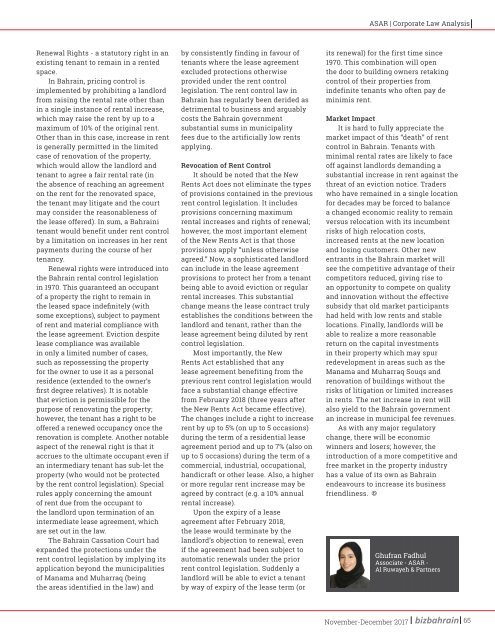BizBahrain Magazine Nov-Dec 2017
Create successful ePaper yourself
Turn your PDF publications into a flip-book with our unique Google optimized e-Paper software.
ASAR | Corporate Law Analysis<br />
Renewal Rights - a statutory right in an<br />
existing tenant to remain in a rented<br />
space.<br />
In Bahrain, pricing control is<br />
implemented by prohibiting a landlord<br />
from raising the rental rate other than<br />
in a single instance of rental increase,<br />
which may raise the rent by up to a<br />
maximum of 10% of the original rent.<br />
Other than in this case, increase in rent<br />
is generally permitted in the limited<br />
case of renovation of the property,<br />
which would allow the landlord and<br />
tenant to agree a fair rental rate (in<br />
the absence of reaching an agreement<br />
on the rent for the renovated space,<br />
the tenant may litigate and the court<br />
may consider the reasonableness of<br />
the lease offered). In sum, a Bahraini<br />
tenant would benefit under rent control<br />
by a limitation on increases in her rent<br />
payments during the course of her<br />
tenancy.<br />
Renewal rights were introduced into<br />
the Bahrain rental control legislation<br />
in 1970. This guaranteed an occupant<br />
of a property the right to remain in<br />
the leased space indefinitely (with<br />
some exceptions), subject to payment<br />
of rent and material compliance with<br />
the lease agreement. Eviction despite<br />
lease compliance was available<br />
in only a limited number of cases,<br />
such as repossessing the property<br />
for the owner to use it as a personal<br />
residence (extended to the owner’s<br />
first degree relatives). It is notable<br />
that eviction is permissible for the<br />
purpose of renovating the property;<br />
however, the tenant has a right to be<br />
offered a renewed occupancy once the<br />
renovation is complete. Another notable<br />
aspect of the renewal right is that it<br />
accrues to the ultimate occupant even if<br />
an intermediary tenant has sub-let the<br />
property (who would not be protected<br />
by the rent control legislation). Special<br />
rules apply concerning the amount<br />
of rent due from the occupant to<br />
the landlord upon termination of an<br />
intermediate lease agreement, which<br />
are set out in the law.<br />
The Bahrain Cassation Court had<br />
expanded the protections under the<br />
rent control legislation by implying its<br />
application beyond the municipalities<br />
of Manama and Muharraq (being<br />
the areas identified in the law) and<br />
by consistently finding in favour of<br />
tenants where the lease agreement<br />
excluded protections otherwise<br />
provided under the rent control<br />
legislation. The rent control law in<br />
Bahrain has regularly been derided as<br />
detrimental to business and arguably<br />
costs the Bahrain government<br />
substantial sums in municipality<br />
fees due to the artificially low rents<br />
applying.<br />
Revocation of Rent Control<br />
It should be noted that the New<br />
Rents Act does not eliminate the types<br />
of provisions contained in the previous<br />
rent control legislation. It includes<br />
provisions concerning maximum<br />
rental increases and rights of renewal;<br />
however, the most important element<br />
of the New Rents Act is that those<br />
provisions apply “unless otherwise<br />
agreed.” Now, a sophisticated landlord<br />
can include in the lease agreement<br />
provisions to protect her from a tenant<br />
being able to avoid eviction or regular<br />
rental increases. This substantial<br />
change means the lease contract truly<br />
establishes the conditions between the<br />
landlord and tenant, rather than the<br />
lease agreement being diluted by rent<br />
control legislation.<br />
Most importantly, the New<br />
Rents Act established that any<br />
lease agreement benefiting from the<br />
previous rent control legislation would<br />
face a substantial change effective<br />
from February 2018 (three years after<br />
the New Rents Act became effective).<br />
The changes include a right to increase<br />
rent by up to 5% (on up to 5 occasions)<br />
during the term of a residential lease<br />
agreement period and up to 7% (also on<br />
up to 5 occasions) during the term of a<br />
commercial, industrial, occupational,<br />
handicraft or other lease. Also, a higher<br />
or more regular rent increase may be<br />
agreed by contract (e.g. a 10% annual<br />
rental increase).<br />
Upon the expiry of a lease<br />
agreement after February 2018,<br />
the lease would terminate by the<br />
landlord’s objection to renewal, even<br />
if the agreement had been subject to<br />
automatic renewals under the prior<br />
rent control legislation. Suddenly a<br />
landlord will be able to evict a tenant<br />
by way of expiry of the lease term (or<br />
its renewal) for the first time since<br />
1970. This combination will open<br />
the door to building owners retaking<br />
control of their properties from<br />
indefinite tenants who often pay de<br />
minimis rent.<br />
Market Impact<br />
It is hard to fully appreciate the<br />
market impact of this “death” of rent<br />
control in Bahrain. Tenants with<br />
minimal rental rates are likely to face<br />
off against landlords demanding a<br />
substantial increase in rent against the<br />
threat of an eviction notice. Traders<br />
who have remained in a single location<br />
for decades may be forced to balance<br />
a changed economic reality to remain<br />
versus relocation with its incumbent<br />
risks of high relocation costs,<br />
increased rents at the new location<br />
and losing customers. Other new<br />
entrants in the Bahrain market will<br />
see the competitive advantage of their<br />
competitors reduced, giving rise to<br />
an opportunity to compete on quality<br />
and innovation without the effective<br />
subsidy that old market participants<br />
had held with low rents and stable<br />
locations. Finally, landlords will be<br />
able to realize a more reasonable<br />
return on the capital investments<br />
in their property which may spur<br />
redevelopment in areas such as the<br />
Manama and Muharraq Souqs and<br />
renovation of buildings without the<br />
risks of litigation or limited increases<br />
in rents. The net increase in rent will<br />
also yield to the Bahrain government<br />
an increase in municipal fee revenues.<br />
As with any major regulatory<br />
change, there will be economic<br />
winners and losers; however, the<br />
introduction of a more competitive and<br />
free market in the property industry<br />
has a value of its own as Bahrain<br />
endeavours to increase its business<br />
friendliness.<br />
Ghufran Fadhul<br />
Associate - ASAR -<br />
Al Ruwayeh & Partners<br />
<strong>Nov</strong>ember-<strong>Dec</strong>ember <strong>2017</strong><br />
65

















